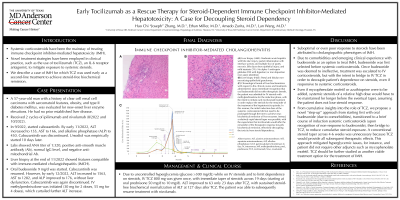Monday Poster Session
Category: Liver
P2509 - Early Tocilizumab as a Rescue Therapy for Steroid-Dependent Immune Checkpoint Inhibitor-Mediated Hepatotoxicity: A Case for Decoupling Steroid Dependency
Monday, October 23, 2023
10:30 AM - 4:15 PM PT
Location: Exhibit Hall

Has Audio

Hao Chi Zhang, MD
University of Texas MD Anderson Cancer Center
Houston, TX
Presenting Author(s)
Hao Chi Zhang, MD1, Ethan Miller, MD1, Amado Zurita, MD2, Lan Wang, MD1
1University of Texas MD Anderson Cancer Center, Houston, TX; 2UT MD Anderson Cancer Center, Houston, TX
Introduction: Systemic corticosteroids have been the mainstay of treating immune checkpoint inhibitor-mediated hepatotoxicity (IMH). Novel treatment strategies have been employed in clinical practice, such as the use of tocilizumab (TCZ), an IL-6 receptor antagonist, to mitigate exposure to systemic steroids. We describe a case of IMH for which TCZ was used early as a second-line treatment to achieve steroid-free biochemical remission.
Case Description/Methods: A 57-year-old man with a history of clear cell renal cell carcinoma with sarcomatoid features, obesity, and type II diabetes mellitus, was evaluated for new-onset liver enzyme elevations. He had no prior established liver disease. He received 2 cycles of ipilimumab and nivolumab (8/2022 and 10/2022). In 9/2022, he started cabozantinib. By early 11/2022, ALT increased to 155, AST to 166, and alkaline phosphatase (ALP) to 430. Cabozantinib was discontinued. Ursodiol was empirically started 10 days later. Labs showed ANA titer of 1:320, positive anti-smooth muscle antibody, normal IgG level, and negative anti-mitochondrial antibody. Liver biopsy was obtained at the end of 11/2022, with features compatible with immune-mediated cholangiohepatitis (IMCH). Oral budesonide 9 mg/d was started. Cabozantinib was resumed. However, by early 12/2022, ALT increased to 1563, AST to 1282, and ALP improved to 176, without liver dysfunction. Cabozantinib was again discontinued. IV methylprednisolone was initiated (30 mg for 2 doses, 55 mg for 4 doses), which curtailed further ALT increase. Due to uncontrolled hyperglycemia (glucose >300 mg/dL) while on IV steroids and to limit dependence on steroids, IV TCZ 800 mg was given once, with immediate taper of steroids across 19 days (starting at oral prednisone 50 mg/d to 10 mg/d). ALT improved to 63 only 23 days after TCZ, with sustained steroid-free biochemical normalization of ALT at 127 days after TCZ. The patient resumed treatment with nivolumab.
Discussion: To treat IMH, we propose a novel "step-up" approach from oral budesonide (due to comorbidities) to a brief course of induction systemic corticosteroids (upon recognition of non-response to budesonide), then bridged to TCZ, to reduce cumulative steroid exposure. A steroid taper across 4-6 weeks was unnecessary because TCZ would provide all subsequent therapeutic effects. This mitigated hyperglycemic issues, for instance, and patient did not require other adjuncts such as mycophenolate mofetil. TCZ should be further studied as another viable treatment option for IMH.

Disclosures:
Hao Chi Zhang, MD1, Ethan Miller, MD1, Amado Zurita, MD2, Lan Wang, MD1. P2509 - Early Tocilizumab as a Rescue Therapy for Steroid-Dependent Immune Checkpoint Inhibitor-Mediated Hepatotoxicity: A Case for Decoupling Steroid Dependency, ACG 2023 Annual Scientific Meeting Abstracts. Vancouver, BC, Canada: American College of Gastroenterology.
1University of Texas MD Anderson Cancer Center, Houston, TX; 2UT MD Anderson Cancer Center, Houston, TX
Introduction: Systemic corticosteroids have been the mainstay of treating immune checkpoint inhibitor-mediated hepatotoxicity (IMH). Novel treatment strategies have been employed in clinical practice, such as the use of tocilizumab (TCZ), an IL-6 receptor antagonist, to mitigate exposure to systemic steroids. We describe a case of IMH for which TCZ was used early as a second-line treatment to achieve steroid-free biochemical remission.
Case Description/Methods: A 57-year-old man with a history of clear cell renal cell carcinoma with sarcomatoid features, obesity, and type II diabetes mellitus, was evaluated for new-onset liver enzyme elevations. He had no prior established liver disease. He received 2 cycles of ipilimumab and nivolumab (8/2022 and 10/2022). In 9/2022, he started cabozantinib. By early 11/2022, ALT increased to 155, AST to 166, and alkaline phosphatase (ALP) to 430. Cabozantinib was discontinued. Ursodiol was empirically started 10 days later. Labs showed ANA titer of 1:320, positive anti-smooth muscle antibody, normal IgG level, and negative anti-mitochondrial antibody. Liver biopsy was obtained at the end of 11/2022, with features compatible with immune-mediated cholangiohepatitis (IMCH). Oral budesonide 9 mg/d was started. Cabozantinib was resumed. However, by early 12/2022, ALT increased to 1563, AST to 1282, and ALP improved to 176, without liver dysfunction. Cabozantinib was again discontinued. IV methylprednisolone was initiated (30 mg for 2 doses, 55 mg for 4 doses), which curtailed further ALT increase. Due to uncontrolled hyperglycemia (glucose >300 mg/dL) while on IV steroids and to limit dependence on steroids, IV TCZ 800 mg was given once, with immediate taper of steroids across 19 days (starting at oral prednisone 50 mg/d to 10 mg/d). ALT improved to 63 only 23 days after TCZ, with sustained steroid-free biochemical normalization of ALT at 127 days after TCZ. The patient resumed treatment with nivolumab.
Discussion: To treat IMH, we propose a novel "step-up" approach from oral budesonide (due to comorbidities) to a brief course of induction systemic corticosteroids (upon recognition of non-response to budesonide), then bridged to TCZ, to reduce cumulative steroid exposure. A steroid taper across 4-6 weeks was unnecessary because TCZ would provide all subsequent therapeutic effects. This mitigated hyperglycemic issues, for instance, and patient did not require other adjuncts such as mycophenolate mofetil. TCZ should be further studied as another viable treatment option for IMH.

Figure: (A) Liver biopsy (H&E): Moderate acute hepatitis with bile duct injury; portal inflammation with interface activity and multiple foci of spotty necrosis. Bile ducts show epithelial injury; and mild steatosis (5%). No alpha-1 antitrypsin globules (PAS with digestion) or iron deposition (iron stain) identified. (B) Liver biopsy (H&E): Portal and lobular non-necrotizing epithelioid granulomas. (C) Chronological trends of liver biochemistries with respect to the clinical course and treatments administered. Upon immediate recognition that oral budesonide did not offer therapeutic benefit, the patient was admitted for IV steroids with methylprednisolone for the induction phase, with the intent to initiate early tocilizumab treatment in order replace the steroids for the remainder of the treatment of the hepatotoxicity episode. In this manner, the initial induction dose of the systemic corticosteroid did not need to be prolonged through the time to achieve near-biochemical remission of liver enzymes. Instead, a relatively rapid steroid taper was possible, with the expectation that tocilizumab would offer the remainder of the therapeutic response towards biochemical remission, effectively decoupling the toxicity from steroid dependency. Abbreviations: ALT, alanine aminotransferase; AST, aspartate aminotransferase; ALP, alkaline phosphatase; GGT, gamma-glutamyl transferase; d, day; IV, intravenous; MP, methylprednisolone; pred., prednisone; TCZ, tocilizumab; Nivo, nivolumab.
Disclosures:
Hao Chi Zhang indicated no relevant financial relationships.
Ethan Miller indicated no relevant financial relationships.
Amado Zurita: ABX – Grant/Research Support. Curium – Grant/Research Support. HIKMA – Consultant, Speakers Bureau. Janssen – Speakers Bureau. Merck – Grant/Research Support. Pfizer Oncology – Grant/Research Support.
Lan Wang indicated no relevant financial relationships.
Hao Chi Zhang, MD1, Ethan Miller, MD1, Amado Zurita, MD2, Lan Wang, MD1. P2509 - Early Tocilizumab as a Rescue Therapy for Steroid-Dependent Immune Checkpoint Inhibitor-Mediated Hepatotoxicity: A Case for Decoupling Steroid Dependency, ACG 2023 Annual Scientific Meeting Abstracts. Vancouver, BC, Canada: American College of Gastroenterology.
